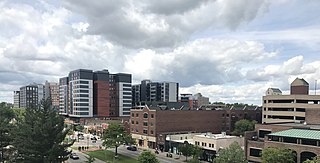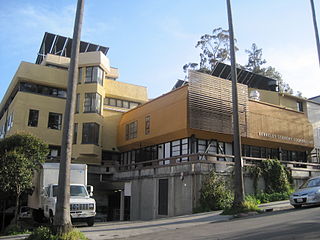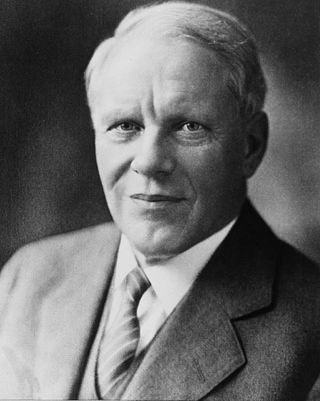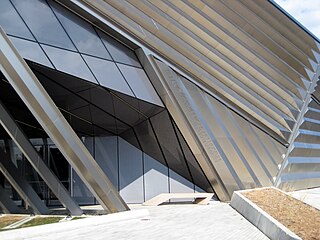
Lansing is the capital of the U.S. state of Michigan. It is mostly in Ingham County, although portions of the city extend west into Eaton County and north into Clinton County. The 2020 census placed the city's population at 112,644, making it the sixth most populous city in Michigan. The population of its metropolitan statistical area (MSA) was 541,297 at the 2020 census, the third largest in the state after metropolitan Detroit and Grand Rapids. It was named the new state capital of Michigan in 1847, ten years after Michigan became a state.

East Lansing is a city in the U.S. state of Michigan. Most of the city lies within Ingham County with a smaller portion extending north into Clinton County. At the 2020 Census the population was 47,741. Located directly east of the state capital of Lansing, East Lansing is well-known as the home of Michigan State University. The city is part of the Lansing–East Lansing metropolitan area.

Michigan State University is a public land-grant research university in East Lansing, Michigan. It was founded in 1855 as the Agricultural College of the State of Michigan, the first of its kind in the United States. After the introduction of the Morrill Act in 1862, the state designated the college a land-grant institution in 1863, making it the first of the land-grant colleges in the United States. The college became coeducational in 1870. In 1955, the state officially made the college a university, and the current name was adopted in 1964. Today, Michigan State has rapidly expanded its footprint across the state of Michigan with facilities all across the state and one of the largest collegiate alumni networks with 634,000 members.
The Berkeley Student Cooperative (BSC) is a student housing cooperative serving primarily UC Berkeley students, but open to any full-time post-secondary student. The BSC houses and/or feeds over 1,300 students in 17 houses and three apartment buildings. Food is provided to residents of the 17 houses, which also offer boarding meal plans to non-residents. As part of their rental agreement, residents of the houses are required to perform workshifts, typically five hours per week. The BSC is led by a board of directors which is primarily composed of and elected by student members.

Casa Zimbabwe, commonly referred to as CZ, is a student housing cooperative in Berkeley, California housing 124 residents. It is the second largest non-apartment style unit of the Berkeley Student Cooperative (BSC), behind Cloyne Court Hotel. Opened in 1966, it was one of the first co-ed student housing in the nation, as well as the first building intentionally built as a co-op.
Notable Michigan State University student riots occurred during the late 1990s and early 2000s (decade). The most recent riot occurred in 2021.
The history of Michigan State University dates back to 1855, when the Michigan Legislature established the Agricultural College of the State of Michigan under the encouragement of the Michigan State Agricultural Society and the Michigan Farmer, the state's leading agricultural periodical. As the first agricultural college in the United States, the school served as a model for other institutions of its kind established in the period, to give an instance, the Agricultural College of Pennsylvania.

The campus of Michigan State University is located in East Lansing on the banks of the Red Cedar River, and comprises a contiguous area of 5,200 acres (21 km2), 2,000 acres (8.1 km2) of which are developed. Built amid virgin forest, the campus opened in 1855 with three buildings, none of which remain. As an agricultural college, the campus was originally located several miles outside of the city of Lansing, but as the population of the college grew, the city of East Lansing developed just north of the area's main avenue.
The State News is the student newspaper of Michigan State University in East Lansing, Michigan. It is supported by a combination of advertising revenue and a $7.50 refundable tax that students pay at each semester's matriculation. Though The State News is supported by a student tax, the faculty and administration do not interfere in the paper's content. The State News is governed by a Board of Directors, which comprises journalism professionals, faculty and students. In 2010, the Princeton Review ranked The State News as the #8 best college newspaper in the country. And in 2015, the Society of Professional Journalists named TSN as the nation's best daily college newspaper for 2014.

Michigan Coöperative House was founded in 1932 as Michigan Socialist House. It was located at 335 E. Ann Street in Ann Arbor, Michigan, near the University of Michigan campus, and now is located at 315 N. State Street. It is one of the co-op houses making up the Inter-Cooperative Council. In 2016 Michigan Cooperative House and the neighboring Minnies Cooperative House voted to combine the two coops and become one functioning, democratically run cooperative.
A student housing cooperative, also known as co-operative housing, is a housing cooperative for student members. Members live in alternative cooperative housing that they personally own and maintain. These houses are designed to lower housing costs while providing an educational and community environment for students to live and grow in. They are, in general, nonprofit, communal, and self-governing, with students pooling their monetary and personal resources to create a community style home. Many student housing cooperatives share operation and governing of the house. As with most cooperatives, student housing coops follow the Rochdale Principles and promote collaboration and community work done by the members for mutual benefit.
Michigan State University Housing is a large and complex network of housing for students and faculty of Michigan State University. Most of the housing is in the form of residence halls on the school's campus, but there are also university apartments, fraternity and sorority housing, and free-standing housing for grad students, faculty and staff.

Zolton Anton Ferency was an American lawyer, political activist and Professor of Criminal Justice at Michigan State University (MSU).
Spartan Housing Cooperative (SHC) is a nonprofit member owned and operated housing cooperative. The SHC was formed as in 1969, as a federation of existing student housing cooperatives in East Lansing. Since the first of the SHC's member houses formed 69 years ago, SHC has accumulated more than 4,000 members.

Wilbur O. Hedrick (1868–1954) started as a professor of economics at Michigan State College in 1908.
Escher Cooperative House, named after artist M. C. Escher, is one of the Inter-Cooperative Council at the University of Michigan's (ICC) 16 student housing cooperatives. It is located at 1500 to 1520 Gilbert Court in Ann Arbor, Michigan. The only North Campus-located cooperative, it is the ICC's largest community with over 150 spaces of residents and 9 separately themed "suites." It is also the only building in Ann Arbor built specifically for cooperative housing.
Gordon L. Thomas was the mayor of East Lansing, Michigan, from 1961 to 1971. He was a Democratic candidate for delegate to a constitutional convention to rewrite the Michigan Constitution during 1961 and 1962 from Ingham County's second district.

The Eli and Edythe Broad Art Museum is a nonprofit, contemporary art museum designed by Zaha Hadid located on the campus of Michigan State University in East Lansing, Michigan, United States. It opened on November 10, 2012.
New Community is a student housing cooperative located in East Lansing, Michigan and a member house of the Michigan State University Student Housing Cooperative. After having been founded as an independent cooperative in the 1960s, New Community has undergone a series of changes and remains a staple of progressive living in the region.

The University Cooperative Housing Association(UCHA) is a student housing cooperative in Westwood, Los Angeles near the University of California, Los Angeles (UCLA) campus. Able to house and feed over 400 members, the UCHA primarily offers housing to UCLA students, but welcomes members from any institution. The UCHA operates three buildings: Hardman-Hansen Hall (HHH or "Triple H"), Essene Hall, and Robison Hall. Jim Morrison of The Doors purportedly lived at the UCHA during his time at UCLA. Alongside the UCLA campus, Hardman-Hansen and Robison Halls were used as filming locations for the 1982 horror film, The Dorm That Dripped Blood. Many students of China's Lost Generation studying at UCLA resided at the UCHA.











